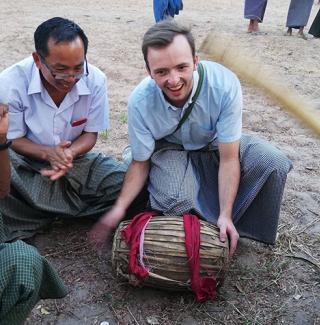Peace Corps Volunteers Choose International & Intercultural Communication Program After COVID-19 Evacuations
By Kip Hagberg, first-year international and intercultural communication student
In the spring of 2020, as the world adjusted to COVID-19, the Peace Corps organization evacuated approximately 7,000 volunteers from their posts. As a proud Peace Corps Coverdell Fellows partner, the international and intercultural communication program was able to provide a guaranteed scholarship to each returned Peace Corps volunteer (RPCV) who applied over the summer of 2020, regardless of how long they had been able to serve when they were evacuated. Kip Hagberg is a first-year student in the international and intercultural communication program and shared his experiences with us as an evacuated Peace Corps volunteer.
Those of us in the Peace Corps are always warned that coming home can launch a challenging period of cultural readjustment. But it was a shock, to say the least, to come home from the Peace Corps experience earlier than planned due to COVID-19.
The Peace Corps global COVID-19 evacuation created a lot of uncertainty. We didn’t know how soon or if we would ever go back to our sites. But those of us who are now at the University of Denver recognized the opportunity available at DU. Some of us applied when we were still overseas, stuck in a hotel waiting to be sent home. Others were back home on our parent's couch, not sure whether to apply for a job in a jobless market or go back to school. The IIC program coordinators gave us all of the information we needed. Most importantly, we finally had the sense that life was not going to be stalled or fruitless.
The international and intercultural communication (IIC) program is a joint effort of the Department of Media, Film & Journalism Studies in the College of Arts, Humanities & Social Sciences and the Josef Korbel School of International Studies, and the combined curriculum has presented opportunities for returning Peace Corps volunteers (RPCVs) to have a robust learning experience. In the IIC MA program, we have been given a chance to reflect on our experiences abroad and to acquire new knowledge that we can carry with us into our future endeavors.
As RPCVs, we have been especially grateful for all of the support from the MFJS staff, as they have provided a very personalized and personable experience that has accommodated our plans and provided new opportunities. Their help has been invaluable throughout the pandemic.
Denver as a city has been good to us so far, too. The almost daily sunshine has kept our spirits high in these unusual times. Outside of classes, we have enjoyed being new members of the Denver and Colorado communities, making the most of fostering puppies and getting ourselves lost (metaphorically) in the mountains.
Coming home early from Peace Corps was not easy for any of us. There was—and there continues to be—a feeling of unfinished work in our now-distant communities. Some of us had to pack our bags and leave within a day's notice, and others of us had not even a week to say goodbye to our communities. The Peace Corps had prepared us to be adaptable, which has proven to be important in these uncertain times. And we are especially appreciative of the city, state, and most importantly the University of Denver and the IIC program, which has provided a sense of belonging and has given us a new home location in which to grow.



